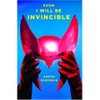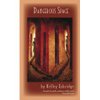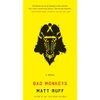It seems obvious at this point that I’m not going to get around to giving each of these fine books a post of their very own (which they definitely deserve), and I think they’d make a fabulous trio of reads too. So, this.
 Soon I Will Be Invincible by Austin Grossman
Soon I Will Be Invincible by Austin Grossman
I’m surprised there hasn’t been more blog buzz about this book, since it’s clearly so buzzable. The movie rights have already been sold, the design work makes it undeniably appealing as an object, and it’s trading in tropes that are familiar to anyone steeped in the waters of American superhero comics, even a little bit. But I’m getting ahead of myself. Soon I Will Be Invincible switches between two viewpoint characters, supergenius Doctor Impossible (supervillain) and recently-constructed cyborg Fatale (newest member of superhero team The Champions), to tell the story of what happens when this world’s analogue to Superman turns up missing (then dead), just as Doctor Impossible breaks out of prison.
There’s nothing all that surprising about the book itself, except perhaps how enjoyable and lovingingly crafted it is. The thing I liked best is that while Austin Grossman has a clear appreciation for the absurdities of the milieu, he approaches the material with utter sincerity. Which is not to say it’s not funny at times — it is, very much so, but it’s not looking down on the source material, it’s expanding on it. That shows in touches like how the superhero headquarters smells like a hospital because living as a super is like living with a chronic illness, always on pills and getting infections and upgrades and the like. Or the generational world-building, the clear differences between these superheroes and their parents’ generation. Despite this, it took me a few chapters to be won over, and I tell you that in case you’re resistant to the book’s pleasures too. Stick it out. If Fatale never manages to be quite as delicious a voice as Doctor Impossible, the "new" Champions storyline does ultimately take off and serve up some deliciousness of its own.
I spotted several of the major plot points coming extremely early in the book, but I half-wonder if that’s intentional. In any case, It certainly didn’t hamper the fun of the read in the least — that’s in exploring the realities of the characters, and their ultimate misfit to the world.
This one’s out next month, and whatever you do avoid this terrible (on many levels) BookForum review if you don’t want to be completely spoiled on the entire novel. (One of the most just-didn’t-get-it reviews I’ve ever read, actually. It only gets one thing right: This may be Matt Ruff’s best novel so far.)
Bad Monkeys was the perfect follow-up to Soon I Will Be Invincible, not least because it’s tackling some of the same issues, but from a completely different point-of-view. This is a novel about the struggle between Evil and Good, on the large scale and the personal one. With the best, largest, most ubiquitous covert agencies EVER. And allusions to Nancy Drew.
Again, I’m getting ahead of myself. The novel opens on Jane Charlotte, who, in detention for killing a man, has identified herself as a member of The Department for the Final Disposition of Irredeemable Persons (aka Bad Monkeys, because that’s who they kill). This is just one unit of "the organization." Her disclosure lands her a pyschiatrist — she agrees to tell him her whole story. The novel is Jane’s story, and, as you’d expect, half the fun is discovering how deep her cover runs, and tracking the crosses, double-crosses and lies through some excruciatingly tense sequences. The other half of the fun is watching Ruff playfully invent the best covert ops agencies ever (the organization’s enemy is "the troop"); I won’t spoil any of the devices and tricks, which is the other reason to avoid any reviews of this one and just read it.
When this book arrived in the mail, I opened the envelope in the car while we were out running errands. I flipped to page one and gave a pleased little noise at the audaciously plain opening (an all white room, bare of props). Within one page, I was laughing out loud and reading a scene to Christopher. It’s a short novel and I burned through it fast, so fast that I actually stopped ten pages from the end and waited an extra day — I wanted to keep reading it as long as possible.
 Dangerous Space by Kelley Eskridge
Dangerous Space by Kelley Eskridge
And now for something a little different. While many people know Kelley Eskridge for her brilliant SF novel Solitaire, she also wrote some kick-ass short stories before that, and they’re all collected here. If you haven’t read them before, you’re in for a treat — particular favorites of mine are "Strings," "And Salome Danced," and "Alien Jane." There’s also the new novella, "Dangerous Space," which is mostly what I’ll talk about here.
Mars is a character who shows up in three of these stories. Mars is never identified as having a particular gender, and it’s absolutely fascinating to track how your own perception of the character as a reader changes depending on the situation and the story. It’s not a distracting technique at all, more one that deepens the reading experience. You’ll catch yourself assigning Mars a gender from time to time, and it’s a very interesting thing to figure out why you are subconsciously making that choice.
"Dangerous Space" is also a Mars story, and it’s a music story. Some of you have probably heard me express my general dissatisfaction with a lot of stories about music. I don’t think I’m alone there. It’s very difficult to write about a band, to write about music, the process of making it and of listening to it, in a way that fully captures it and doesn’t get airy fairy. Eskridge nails it here. Mars signs on as the sound engineer for an unknown indie band after hearing its lead singer, Duncan Black. The story tracks the band’s rise from anonymity to stardom, but more than that, it charts the volatile emotional waters of falling in love with a damaged person, a black hole of need who everyone desires, in gripping, heartrending fashion. We know early on that Mars has it bad for Black, and it’s painfully riveting watching Mars rescue Black from the precipice again and again, never knowing if this time, Black will go over. This story had me completely in, as they say, the palm of its hand, putty-like. Highly, highly recommended, just like the entirety of the collection.

Interesting. I read Mars as female. Did I miss something?
I’m finishing up “…Invincible” right now, after you recommended it in passing a few days ago. Like you say, nothing has been terribly surprising, but the pleasure is in the execution, especially in the Dr. Impossible chapters. I especially like the contrast between Impossible’s threat-making, stilted super villain dialogue with his more conversational narrative voice.
I think most of us probably assign a gender — I don’t think I noticed it until the second story, when I found myself “reassigning,” then went back and noticed there were no actual ID tags one way or the other. And a google has Kelley talking about that a bit in more depth.
That’s it exactly, Bill.
I read Mars as female in the first, male in the second and then thought female in the third….and then thought male.
It’s really interesting how she managed to pull this off so well – you wonder just what gender Mars is, and then you don’t care which I think is really awesome.
“Strings” was also my favorite and I imagine I’ll be writing about it a lot in my review.
…I think most of us probably assign a gender…
I believe you have in the second-to-last sentence of your excellent review. I am very eager to read this now.
I have a copy of Bad Monkeys sitting around and desperately want to read it, but other things keep getting in the way. Can I justify it as Clarke eligible…? That would allow me to bump it up the stack!
Um, sure! Clarke eligible it is. (Um, maybe.)
Doh, Cavin, good catch, but that’s actually just sloppy writing on my part — I let that sentence get too complicated and missed a him that originally referred to Black. Although I will absolutely admit to reading Mars as both male and female in various places, and to sometimes trying to read with the character as both (or neither). And in _most_ of Dangerous Space I probably am assigning a male gender because “sound guy” is something I tend to associate with a man — I realize this is probably utterly untrue and sexist, but there it is… I think there’s even a joke to that effect in the story, because Mars is training one of the band member’s sisters to do sound.
That’s good enough for me.
Going to see Grossman read tonight–tonight, I say!
I have the Grossman on the shelf, ready for reading as soon as I finish my Harry Potter rereads…and those should be done by tomorrow.
I didn’t know there was a new Matt Ruff coming out until you mentioned it – now I can’t wait!
Don’t think I’ve read any Eskridge but it sounds like it might be up my alley…